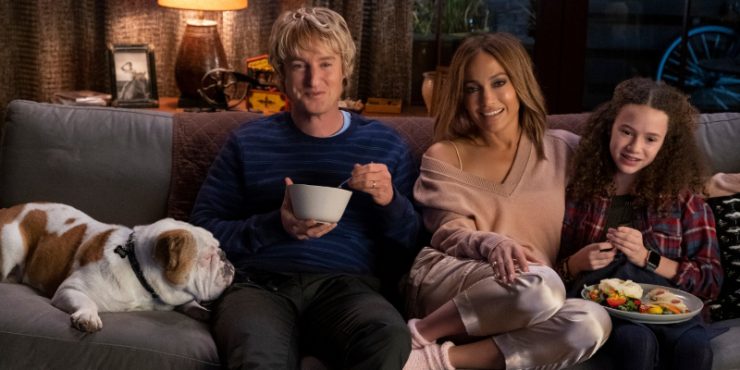I can’t in good conscience call Marry Me a good movie, though the unfortunate truth is that I did enjoy myself. The preposterous romantic comedy stars Jennifer Lopez and Owen Wilson, a pair that upon first glance (and frankly, second and third glance) seems like a mismatch. The film gambles on the charms of its two stars, and almost gets away with it. Lopez’s diamond-encrusted glamour held against Wilson’s dry, folksy delivery never really makes sense, but neither does the film’s basic premise. Kat Valdez (Lopez) is a pop megastar who shares a massive following with her fiance, Bastian (Columbian pop star Maluma). Moments before their high-profile, mid-concert wedding ceremony (which is promoting their new single, “Marry Me”), Kat learns that Bastian is being unfaithful, a discovery that inspires a truly bizarre decision.
This is where Charlie Gilbert (Wilson) enters the story. A divorced math teacher, Charlie is trying his best to help his daughter Lou (Chloe Coleman) adjust to a new school, as well as win back some father-daughter affection that is withering with oncoming adolescence. Desperate, he agrees to accompany Lou to Kat’s concert-slash-marriage ceremony. Out of place and very conveniently holding a sign with the title of the new single (again, called “Marry Me”), he manages to be in the right place at the right time when Kat decides, in front of hundreds of thousands of fans both in-person and in a wide streaming audience, that she won’t marry Bastian after all. She instead chooses Charlie from the crowd at random to join her onstage to replace Bastian as her new groom. Yielding to pressure from Lou and the rest of the crowd, Charlie gets up on stage and follows through in marrying Kat.
Perhaps what I’m feeling is nostalgia, both for a time when Lopez and Wilson were both more high profile stars, and also for a time when these types of unhinged romcoms weren’t so rare. Lopez and Wilson don’t so much have chemistry as much as they are committed to the genre that requires them to have it, which has its own form of charm (important to note that Wilson’s role was actually meant to go to Armie Hammer before his career derailment, or whatever you might call it). Director Kat Coiro is more dedicated to tried and true romcom tropes (opposites attract! the jealous, philandering ex-boyfriend!) than she is to producing something like natural affection between her stars. She also appears to lack anything in the form of visual directorial competence. Marry Me is the kind of film that is so inexplicably bad that it actually endears its stars to the audience. Lopez and Wilson are putting themselves through this crap… for us.
There is something just inherently funny about someone as notoriously vain as Jennifer Lopez falling for the aw-shucks timidity of Owen Wilson. In this way, you find yourself laughing more at the movie’s expense than at the film’s stale jokes. In a supporting comedic relief part, Sarah Silverman plays a Valdez-obsessed guidance counselor at Charlie’s school; Silverman is putting in the man hours for this part but it’s easily the least funny screen appearance in her entire career. If nothing else, Marry Me is still a testament to importance of star power, of the inherent value of having someone as famous as Lopez in your movie, and how it raises the floor of just how bad it can be. It’s likely that I’ll never voluntarily watch Marry Me again in my life, and that’s probably for the best. The dispensability of it seems baked into the premise.
Directed by Kat Coiro










